For this web site, every day and every month should be Black History Month, but this web site has never particularly been a supporter because we do not support anything that singles out a particular race, one above the other. However, this web site does recognize that this country has had many (more than we can show here) men and women of the Black race who were large contributors to the establishment of America. We can find their numbers as patriots, scientists, soldiers, educators, explorers, entrepreneurs, inventors, civil rights leaders, writers, athletes, and world leaders. I focused on these people because so many times people of color are left out of the important parts of history
If you know of someone you would like to be considered for a place on this page, please contact us at [email protected]
If you know of someone you would like to be considered for a place on this page, please contact us at [email protected]
"No man can put a chain about the ankle of his fellow man without at last finding the other end fastened about his own neck."
– Frederick Douglass
– Frederick Douglass
FREDERICK DOUGLASS 1818-1895
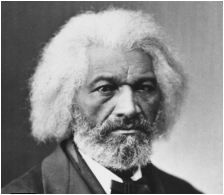
Abolitionist leader Frederick Douglass was born into slavery in Talbot County, Maryland. He became one of the most famous intellectuals of his time, advising presidents and lecturing to thousands on a range of causes, including women’s rights and Irish home rule. Among Douglass’ writings are several autobiographies eloquently describing his experiences in slavery and his life after the Civil War.
Frederick Augustus Washington Bailey was born into slavery in Talbot County, Maryland, around 1818. The exact year and date of Douglass' birth are unknown, though later in life he chose to celebrate it on February 14. Douglass lived with his maternal grandmother, Betty Bailey. At a young age, Douglass was selected in live in the home of the plantation owners, one of whom may have been his father. His mother, an intermittent presence in his life, died when he was around 10.
Frederick Douglass was given to Lucretia Auld, the wife of Thomas Auld, following the death of his master. Lucretia sent Frederick to serve her brother-in-law, Hugh Auld, at his Baltimore home. It was at the Auld home that Frederick Douglass first acquired the skills that would vault him to national celebrity. Defying a ban on teaching slaves to read and write, Hugh Auld’s wife Sophia taught Douglass the alphabet when he was around 12. When Hugh Auld forbade his wife’s lessons, Douglass continued to learn from white children and others in the neighborhood.
It was through reading that Douglass’ ideological opposition to slavery began to take shape. He read newspapers avidly, and sought out political writing and literature as much as possible. In later years, Douglass credited The Columbian Orator with clarifying and defining his views on human rights. Douglass shared his newfound knowledge with other enslaved people. Hired out to William Freeland, he taught other slaves on the plantation to read the New Testament at a weekly church service. Interest was so great that in any week, more than 40 slaves would attend lessons. Although Freeland did not interfere with the lessons, other local slave owners were less understanding. Armed with clubs and stones, they dispersed the congregation permanently. READ MORE
Frederick Augustus Washington Bailey was born into slavery in Talbot County, Maryland, around 1818. The exact year and date of Douglass' birth are unknown, though later in life he chose to celebrate it on February 14. Douglass lived with his maternal grandmother, Betty Bailey. At a young age, Douglass was selected in live in the home of the plantation owners, one of whom may have been his father. His mother, an intermittent presence in his life, died when he was around 10.
Frederick Douglass was given to Lucretia Auld, the wife of Thomas Auld, following the death of his master. Lucretia sent Frederick to serve her brother-in-law, Hugh Auld, at his Baltimore home. It was at the Auld home that Frederick Douglass first acquired the skills that would vault him to national celebrity. Defying a ban on teaching slaves to read and write, Hugh Auld’s wife Sophia taught Douglass the alphabet when he was around 12. When Hugh Auld forbade his wife’s lessons, Douglass continued to learn from white children and others in the neighborhood.
It was through reading that Douglass’ ideological opposition to slavery began to take shape. He read newspapers avidly, and sought out political writing and literature as much as possible. In later years, Douglass credited The Columbian Orator with clarifying and defining his views on human rights. Douglass shared his newfound knowledge with other enslaved people. Hired out to William Freeland, he taught other slaves on the plantation to read the New Testament at a weekly church service. Interest was so great that in any week, more than 40 slaves would attend lessons. Although Freeland did not interfere with the lessons, other local slave owners were less understanding. Armed with clubs and stones, they dispersed the congregation permanently. READ MORE
BOOKER T. WASHINGTON 1856-1915
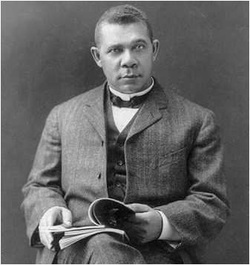
He had a very humble beginning. He was bi-racial but he never knew his white father. started the Tuskegee Institute. He was an eloquent speaker and used this skill for the benefit of Tuskegee Institute. The school continued to grow. All students at the school were required to work in addition to their academic* studies. They chopped trees, cleared land, made bricks, built furniture, and constructed buildings. Classes were started to teach trades and professions.
In 1895 he was invited to give a speech at an Exposition in Atlanta. In it he urged blacks and whites to work together. Afterward Harvard University gave him an honorary degree. Friends gave money for Booker and his wife to visit Europe where they had tea with Queen Victoria.
The school flourished. George Washington Carver came to teach agricultural* science. People of wealth took an interest in the education of blacks. Andrew Carnegie helped.
Booker T. Washington, more than any other black man of his time, helped to elevate his people through education.
In 1895 he was invited to give a speech at an Exposition in Atlanta. In it he urged blacks and whites to work together. Afterward Harvard University gave him an honorary degree. Friends gave money for Booker and his wife to visit Europe where they had tea with Queen Victoria.
The school flourished. George Washington Carver came to teach agricultural* science. People of wealth took an interest in the education of blacks. Andrew Carnegie helped.
Booker T. Washington, more than any other black man of his time, helped to elevate his people through education.
Henrietta Lacks
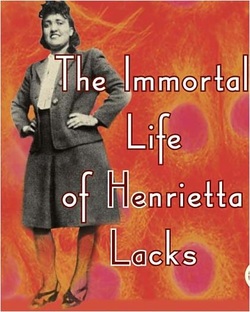
Henrietta was a black woman who died of cancer in 1951. When scientists began research with her tissue they discovered the cells did not die, even though cells in the lab generally died after a short while. Using these "immortal" cells Jonas Salk developed polio vaccine, experiments in space were done, and many advances were made in the field of medicine and pharmaceuticals.
Rebecca Skloot wrote a book about Henrietta in 2009, The Immortal Life of Henrietta Lacks" of which was made into a movie and is to be released in 2013.
Martin Luther King, Jr. 1929-1968
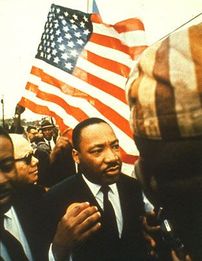
Peaceful marches were organized and people were arrested because they were taking part in Mr. King’s beliefs of equality for all. Even little children were sprayed with water hoses and arrested! On August 28, 1963 Martin Luther King and other leaders led a march into Washington D.C. Over 200,000 people marched from the Washington Monument to the Lincoln Memorial. It was here Dr. King delivered his "I Have a Dream" message. In 1964 he was awarded the Nobel Peace Prize in Norway. He gave the $54,000 prize money to the civil rights groups which were working to secure the rights blacks deserved. Dr. King was put in jail 30 times for his resistance. Some people tried to kill him. Then on April 4, 1968 a gunman did murder him in Memphis, Tennessee. His widow Coretta Scott King passed away January 30, 2006.
Harriett Tubman 1820-1913
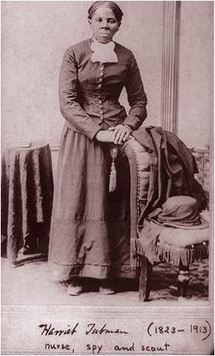
Harriet was born around 1820 in Maryland. Her parents were slaves, so she also was a slave when she was born. She had to work even when she was a little child. When she was twelve years old, she suffered a serious injury when an overseer threw a heavy weight which hit her in the head. Harriet married John Tubman at the age of 25 and went to work on the “underground railroad”. She made nineteen trips as a "conductor", risking her life every time, and successfully freed about 300 slaves. She carried a gun and threatened any slave who wanted to turn back. A reward of $40,000 was offered to any bounty hunter who brought Harriet in to the authorities, but she managed to avoid capture. She was such a brave woman! Harriet became known as "Moses" because she was freeing her people just as Moses freed the children of Israel from Egyptian slavery. She made friends with many influential* people including abolitionists* John Brown and Frederick Douglas. She befriended Senator William H. Seward from New York. He and his wife provided a house where she moved her parents down from Canada. She later was able to buy the home and stayed there when she was not on the road helping slaves escape.
During the Civil War Harriet worked for the Union Army. Sometimes she worked as a cook, sometimes she served as a nurse, and even worked as a spy! After the war she returned to her home in Auburn, New York.
During the Civil War Harriet worked for the Union Army. Sometimes she worked as a cook, sometimes she served as a nurse, and even worked as a spy! After the war she returned to her home in Auburn, New York.
Phillis Wheatley About 1756 - 1784
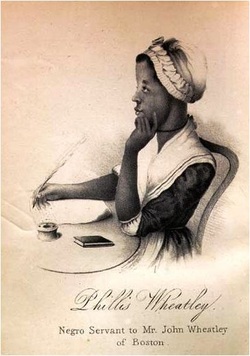
The year was 1761 and the schooner*, Phillis, was about to leave Africa. The captain, Captain Gwinn had ordered that no children should be on his ship however, among the captives being taken aboard there was a small African girl who had been kidnapped from her family. The nameless child was dressed only in a soiled piece of carpet.
When the ship arrived in Boston, Susanna Wheatley went aboard to pick out a slave to help her. She had planned to buy a woman slave, but she took pity on the poor little waif* who was about seven years old and bought her instead. She named her "Phillis" after the name of the ship which had brought her to America. The Wheatley family was wealthy and lived in a mansion on a busy street in Boston. Phillis was treated well and in fact the family treated her like a member of the family. She ate at the table with them, had her own room in the attic, and did not have to do the chores the other slaves were required to do.
Susanna had an 18-year-old daughter Mary and she became Phillis' tutor. She taught Phillis to read and schooled her in geography, astronomy, history, the Bible, and classic literature. She even taught her Latin and Phillis could read books written in Latin. It was as if Mary had taken a precious jewel and polished it until it shone brightly. In time the slave girl became possibly the most educated woman in Boston. She learned to write and would correspond with people, even famous people of the day. Phillis became a poet.
She wrote a wonderful poem called "To His Excellency General Washington" and sent the general a copy of it. He referred to her as a "poetical genius". Four months later she received an invitation from General George Washington to come for a visit. They met for about thirty minutes. Washington's secretary sent the letter to the Virginia Gazette and it was published in the newspaper on March 20, 1776.
When the ship arrived in Boston, Susanna Wheatley went aboard to pick out a slave to help her. She had planned to buy a woman slave, but she took pity on the poor little waif* who was about seven years old and bought her instead. She named her "Phillis" after the name of the ship which had brought her to America. The Wheatley family was wealthy and lived in a mansion on a busy street in Boston. Phillis was treated well and in fact the family treated her like a member of the family. She ate at the table with them, had her own room in the attic, and did not have to do the chores the other slaves were required to do.
Susanna had an 18-year-old daughter Mary and she became Phillis' tutor. She taught Phillis to read and schooled her in geography, astronomy, history, the Bible, and classic literature. She even taught her Latin and Phillis could read books written in Latin. It was as if Mary had taken a precious jewel and polished it until it shone brightly. In time the slave girl became possibly the most educated woman in Boston. She learned to write and would correspond with people, even famous people of the day. Phillis became a poet.
She wrote a wonderful poem called "To His Excellency General Washington" and sent the general a copy of it. He referred to her as a "poetical genius". Four months later she received an invitation from General George Washington to come for a visit. They met for about thirty minutes. Washington's secretary sent the letter to the Virginia Gazette and it was published in the newspaper on March 20, 1776.
Hiram Rhodes Revels 1827 - 1901
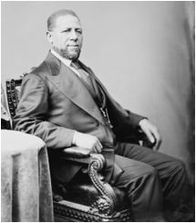
Hiram was a minister in the African Methodist Episcopal Church (AME), college president and a politician. He was the first person of color to serve in the United States Senate, and in the U.S. Congress overall. He represented Mississippi in 1870 and 1871 during Reconstruction.
During the American Civil War, he helped organize two regiments of the United States Colored Troops and served as a chaplain. He was President of Alcorn Agricultural and Mechanical College (now Alcorn State University), a historically black college located in Claiborne County, Mississippi. He taught philosophy as well. In 1873, Revels took a leave of absence from Alcorn to serve as Mississippi's secretary of state ad interim.
During the American Civil War, he helped organize two regiments of the United States Colored Troops and served as a chaplain. He was President of Alcorn Agricultural and Mechanical College (now Alcorn State University), a historically black college located in Claiborne County, Mississippi. He taught philosophy as well. In 1873, Revels took a leave of absence from Alcorn to serve as Mississippi's secretary of state ad interim.
Elizabeth Keckley 1818-1907
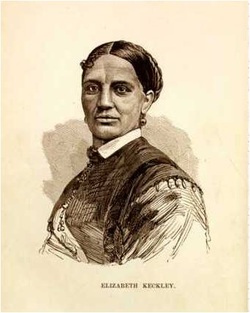
Elizabeth Keckley was born a slave in Virginia. According to her own words, she was born of slave parents. Historical writings tell that her father was Colonel Burwell, the plantation owner.
She lived a very hard life but came to be a grand dressmaker. She wished to be free from slavery and one of her patrons, Mrs. Le Bourgois (luh BOOR zhwah) in St. Louis came to her rescue and raised the money. Elizabeth was thirty-seven years old and on the day of her release which was November 13, 1855, she accepted the money as a loan and worked earnestly until it was all repaid in the amount of $1200.
After about five years she moved to Washington D.C. where she built up a very grand business to some of the most important ladies of which one was Mary Todd Lincoln.
When President Lincoln was assassinated Mrs. Lincoln immediately called for her confidante*, Elizabeth, to come to be with her. Within a few weeks Mrs. Lincoln moved to Chicago and insisted her friend go with her. She stayed for a while and then returned to Washington and opened her own dress shop.
She lived a very hard life but came to be a grand dressmaker. She wished to be free from slavery and one of her patrons, Mrs. Le Bourgois (luh BOOR zhwah) in St. Louis came to her rescue and raised the money. Elizabeth was thirty-seven years old and on the day of her release which was November 13, 1855, she accepted the money as a loan and worked earnestly until it was all repaid in the amount of $1200.
After about five years she moved to Washington D.C. where she built up a very grand business to some of the most important ladies of which one was Mary Todd Lincoln.
When President Lincoln was assassinated Mrs. Lincoln immediately called for her confidante*, Elizabeth, to come to be with her. Within a few weeks Mrs. Lincoln moved to Chicago and insisted her friend go with her. She stayed for a while and then returned to Washington and opened her own dress shop.
